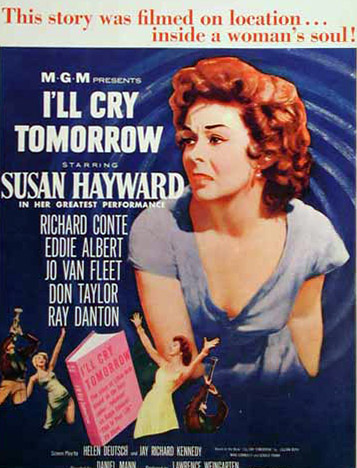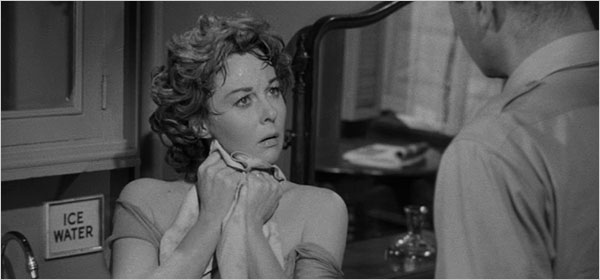SUSAN HAYWARD CENTENNIAL WEEK
 "this story was filmed on location... inside a woman's soul!"
"this story was filmed on location... inside a woman's soul!"
-I'll Cry Tomorrow's tagline.
by Eric Blume
I’ll Cry Tomorrow, a biopic of singer Lillian Roth, won Susan Hayward the fourth of her five Oscar nominations, in 1955. The film starts with a young Lillian and her stage mother, played by Jo Van Fleet. Ten minutes in, though, Hayward gets a true star entrance belting out “Sing You Sinners” in a lengthy number with only four cuts.
It’s a fun introduction, partially because you try to place yourself in 1955, when part of the excitement (one guesses) was hearing Hayward sing for the first time, and it’s quite a boisterous number. Then Hayward was known mostly as a tragedienne (Hollywood star variety), it must have been a blast for audiences to see Hayward let loose (Hollywood star style) in a big production number where she gets to snarl and dance (Hollywood star style, as the musicality doesn’t come easily to her)...
“Sinners” is one of four songs that Hayward sings in the movie, and while her voice lacks variety and subtlety, she brings it. In fact, her singing style is somewhat reflective of her acting style in the first half of the movie: it’s a glorious one-emotion-at-a-time performance.
Lillian Roth hasn’t survived the way other singers of that era (e.g., Billie Holliday) have, so we can accept Hayward without any comparison to the real-life subject. I’ll Cry Tomorrow follows the standard biopic trajectory, so there are no surprises, except the big one: watching this movie for the first time, over 60 years after its release, Roth’s actual story is pretty remarkable. A child Broadway performer, she goes on to become a wealthy recording star, only to degenerate into a Skid Row alcoholic in abusive relationships who literally stumbles penniless into Alcoholics Anonymous. Evidently Roth was one of the first famous people ever to talk about her alcoholism (on an episode of "This Is Your Life" in 1953).

The first half of the picture, Hayward hits all of her marks and plays all of her scenes smartly beat-by-beat. But there’s no complexity, and actually her Lillian seems to not exist outside of her relationship to men: she comes across spineless and weak, and not very interesting, and it doesn’t feel that’s a larger decision by Hayward and the creative team. We’re in 1950s movieland, where it was important that actors and characters were likable.
But the film takes on a cumulative power, as does Hayward. The film gets darker than you might think for its time period, including a borderline scary second marriage where Roth sneaks out in the middle of the night to flee another battering and begins wandering the streets and having seizures.
In the last half hour of the movie, Hayward drives the film past melodrama. She pushes pretty far and shows you how Roth became a terrified, lonely cat of a person, so far removed from actual reality that she fell into perpetual stupor. For 50s cinema, Roth’s final descent before redemption remains fairly harrowing, and Hayward doesn’t shy away from the demands. She makes you understand Roth’s desire to be completely alone due to her colossal shame, as she disassociates from herself and from the world. Hayward finds a near-catatonia that’s chilling and effective.
When Roth walks into Alcoholics Anonymous to change her life, Hayward lets you feel the monumental power of the decision. In this scene, she remains so closed off from human contact, let alone the possibility of change, that she’s literally backing away from people who are simply greeting her. Hayward doesn’t “play brave” but in the final stretch of the movie, she simply IS. It’s a knockout last inning that proves why Hayward was one of our best.